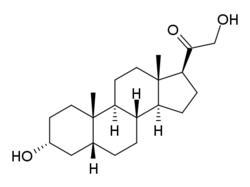Chemistry:Tetrahydrodeoxycorticosterone
From HandWiki
Short description: Chemical compound
 | |
| Clinical data | |
|---|---|
| Other names | THDOC |
| Identifiers | |
| |
| CAS Number | |
| PubChem CID | |
| UNII | |
| Chemical and physical data | |
| Formula | C21H34O3 |
| Molar mass | 334.500 g·mol−1 |
| 3D model (JSmol) | |
| |
| (verify) | |
Tetrahydrodeoxycorticosterone (abbreviated as THDOC; 3α,21-dihydroxy-5α-pregnan-20-one), also referred to as allotetrahydrocorticosterone, is an endogenous neurosteroid.[1] It is synthesized from the adrenal hormone deoxycorticosterone by the action of two enzymes, 5α-reductase type I and 3α-hydroxysteroid dehydrogenase.[2] THDOC is a potent positive allosteric modulator of the GABAA receptor, and has sedative, anxiolytic and anticonvulsant effects.[3][4][5] Changes in the normal levels of this steroid particularly during pregnancy and menstruation may be involved in some types of epilepsy (catamenial epilepsy) and premenstrual syndrome,[6] as well as stress, anxiety and depression.[7][8][9][10][11]
Chemistry
See also
References
- ↑ "Endogenous neurosteroids regulate GABAA receptors through two discrete transmembrane sites". Nature 444 (7118): 486–9. November 2006. doi:10.1038/nature05324. PMID 17108970. Bibcode: 2006Natur.444..486H.
- ↑ "Characterization of brain neurons that express enzymes mediating neurosteroid biosynthesis". Proceedings of the National Academy of Sciences of the United States of America 103 (39): 14602–7. September 2006. doi:10.1073/pnas.0606544103. PMID 16984997. Bibcode: 2006PNAS..10314602A.
- ↑ "Anticonvulsant activity of neurosteroids: correlation with gamma-aminobutyric acid-evoked chloride current potentiation". The Journal of Pharmacology and Experimental Therapeutics 270 (3): 1223–9. September 1994. PMID 7932175.
- ↑ "Stress-induced deoxycorticosterone-derived neurosteroids modulate GABA(A) receptor function and seizure susceptibility". The Journal of Neuroscience 22 (9): 3795–805. May 2002. doi:10.1523/JNEUROSCI.22-09-03795.2002. PMID 11978855.
- ↑ "Pharmacology of endogenous neuroactive steroids". Critical Reviews in Neurobiology 15 (3–4): 197–234. 2003. doi:10.1615/critrevneurobiol.v15.i34.20. PMID 15248811.
- ↑ "Reduced serum level of THDOC, an anticonvulsant steroid, in women with perimenstrual catamenial epilepsy". Epilepsia 49 (7): 1221–9. July 2008. doi:10.1111/j.1528-1167.2008.01555.x. PMID 18325018.
- ↑ "Is there a physiological role for the neurosteroid THDOC in stress-sensitive conditions?". Trends in Pharmacological Sciences 24 (3): 103–6. March 2003. doi:10.1016/S0165-6147(03)00023-3. PMID 12628349.
- ↑ "Physiological role of adrenal deoxycorticosterone-derived neuroactive steroids in stress-sensitive conditions". Neuroscience 138 (3): 911–20. 2006. doi:10.1016/j.neuroscience.2005.10.016. PMID 16325348.
- ↑ "Neuroactive steroids as modulators of depression and anxiety". Neuroscience 138 (3): 1041–8. 2006. doi:10.1016/j.neuroscience.2005.07.007. PMID 16310959.
- ↑ "Neuroactive steroids in depression and anxiety disorders: clinical studies". Neuroendocrinology 84 (4): 244–54. 2006. doi:10.1159/000097879. PMID 17159334. https://epub.ub.uni-muenchen.de/16575/1/10_1159_000097879.pdf.
- ↑ "Neurosteroid synthesis-mediated regulation of GABA(A) receptors: relevance to the ovarian cycle and stress". The Journal of Neuroscience 27 (9): 2155–62. February 2007. doi:10.1523/JNEUROSCI.4945-06.2007. PMID 17329412.
 |

